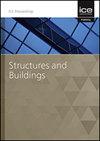Response modification factor evaluation for vertical irregular MRF buildings
IF 1.4
4区 工程技术
Q3 CONSTRUCTION & BUILDING TECHNOLOGY
Proceedings of the Institution of Civil Engineers-Structures and Buildings
Pub Date : 2023-04-21
DOI:10.1680/jstbu.22.00146
引用次数: 0
Abstract
Most design codes assume the nonlinear seismic performance of structures using response reduction/modification factor (R). The R factor is sensitive to a variety of factors in terms of overall ductility and over-strength. This research assesses the actual R factor for vertical irregularity cases for RC bare buildings with moment-resisting frames (MRF) systems. Also, this research derives a significant relationship between R values and identified vertical irregularity index calculated from relative stiffness between adjacent stories. Three-dimensional numerical models are carried out for the soft story and setback irregularity scenarios using ETABS. Modal pushover analysis (MPA) is selected to obtain the inelastic seismic capacity. The obtained results demonstrate that vertical irregular buildings have weak inelastic seismic capacities compared to regular one. So, the response modification factor (R) should be scaled down before the design stage by 15% to 40% for single and combined vertical irregularity scenarios. Structures with a combined asymmetric setback with a soft ground story experience the worst R factor. Also, R factors are sensitive to the identified vertical irregularity index (Vtm) that has 80% regression percent. So, it may be used to specify the allowable vertical irregularity ratio, location, and combination for each seismic zone.竖向不规则MRF建筑响应修正系数评价
大多数设计规范使用响应折减/修正系数(R)来假设结构的非线性抗震性能。R因子对整体延性和超强度方面的各种因素都很敏感。本研究评估具有抗弯矩框架(MRF)系统的钢筋混凝土裸建筑垂直不规则情况的实际R因子。此外,本研究还得出了R值与相邻层间相对刚度计算的识别竖向不规则指数之间的显著关系。利用ETABS对软层和回退不平顺两种情况进行了三维数值模拟。选择模态推覆分析(MPA)来获得非弹性抗震能力。结果表明,竖向不规则建筑的非弹性抗震能力较规则建筑弱。因此,在设计阶段,对于单一和组合垂直不规则情况,响应修正因子(R)应按比例降低15%至40%。不对称后退与软地基层相结合的结构的R因子最差。此外,R因子对识别的垂直不规则指数(Vtm)敏感,其回归率为80%。因此,它可以用来规定每个地震带允许的垂直不规则比、位置和组合。
本文章由计算机程序翻译,如有差异,请以英文原文为准。
求助全文
约1分钟内获得全文
求助全文
来源期刊
CiteScore
3.40
自引率
6.20%
发文量
61
审稿时长
12 months
期刊介绍:
Structures and Buildings publishes peer-reviewed papers on the design and construction of civil engineering structures and the applied research associated with such activities. Topics include the design, strength, durability and behaviour of structural components and systems.
Topics covered: energy conservation, people movement within and around buildings, strength and durability of steel and concrete structural components, and the behaviour of building and bridge components and systems

 求助内容:
求助内容: 应助结果提醒方式:
应助结果提醒方式:


